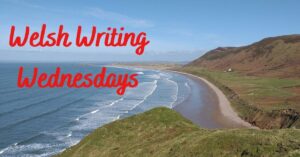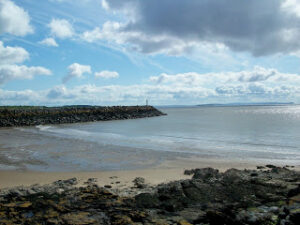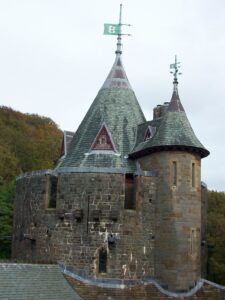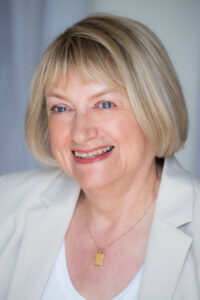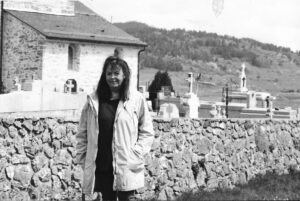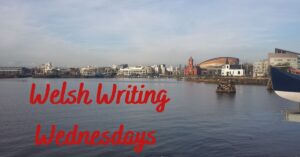 I was born and brought up in the tiny mid-Wales village of Newbridge-on-Wye and moved to nearby Llandrindod Wells when I was fourteen. Fortunate to have had a very free and happy childhood, growing up in such beautiful rural surroundings has always stayed with me. Although I have now spent more years living in the south of Wales, first in Swansea and then for the most part in Cardiff, I still call Llandrindod ‘home’. For as long as I can remember, apart from a very brief spell of wanting to be a glamourous model or an airhostess, I always wanted to become a teacher, my two main loves being English and Art. Having studied in Cardiff, I have taught in a wide range of settings – from opening and running my own nursery, teaching all year groups in primary school, secondary school English and Art and Pottery up to A level, and teaching art, crafts and pottery in adult evening classes when my three children were small. For the last six years of my career in education, I became a Teacher Adviser for English.
I was born and brought up in the tiny mid-Wales village of Newbridge-on-Wye and moved to nearby Llandrindod Wells when I was fourteen. Fortunate to have had a very free and happy childhood, growing up in such beautiful rural surroundings has always stayed with me. Although I have now spent more years living in the south of Wales, first in Swansea and then for the most part in Cardiff, I still call Llandrindod ‘home’. For as long as I can remember, apart from a very brief spell of wanting to be a glamourous model or an airhostess, I always wanted to become a teacher, my two main loves being English and Art. Having studied in Cardiff, I have taught in a wide range of settings – from opening and running my own nursery, teaching all year groups in primary school, secondary school English and Art and Pottery up to A level, and teaching art, crafts and pottery in adult evening classes when my three children were small. For the last six years of my career in education, I became a Teacher Adviser for English.
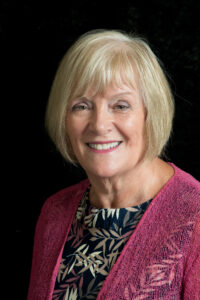 You will notice that I have not yet mentioned writing. I was extremely late to the party and it wasn’t until I joined a writing group at a local library when I retired that I wrote my first piece of fiction. In my job, I was passionate about children’s writing but this was for me, for my enjoyment… and I loved it. I was hooked! Soon, I went on to take a writing class at Cardiff university and began to submit short stories for publication. In October 2019, my first collection of shorts was published. My pieces started getting longer and longer so that, following a novel writing course, I wrote my first full-length novel. My debut novel, Her Mother’s Secret was published in April 2020, followed by Her Sister’s Secret, a few months later, by Ruby Fiction. The third novel in the three-book deal is due out in the summer.
You will notice that I have not yet mentioned writing. I was extremely late to the party and it wasn’t until I joined a writing group at a local library when I retired that I wrote my first piece of fiction. In my job, I was passionate about children’s writing but this was for me, for my enjoyment… and I loved it. I was hooked! Soon, I went on to take a writing class at Cardiff university and began to submit short stories for publication. In October 2019, my first collection of shorts was published. My pieces started getting longer and longer so that, following a novel writing course, I wrote my first full-length novel. My debut novel, Her Mother’s Secret was published in April 2020, followed by Her Sister’s Secret, a few months later, by Ruby Fiction. The third novel in the three-book deal is due out in the summer.
So, what do I write about? My dual-narrative novels are about families and their secrets. The strapline for my publisher is ‘Stories that Inspire Emotions!” and I hope that my books do just that. They are character driven. I have always been fascinated by long-held family secrets and skeletons lurking in cupboards and these form the germs of ideas to develop into a novel.
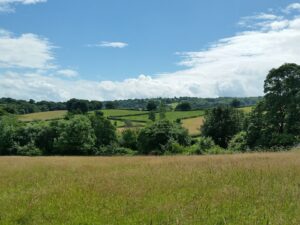 Fascinated by the ever-present link between past and present, I try to explore how actions and decisions made in one era have an impact on subsequent generations. In all my novels, I want to tell two stories showing a special bond between mothers and daughters. The daughters’ stories are written in first person and I’ve tried to get inside their heads, feel their emotions and show the reader why they act in the way they do. In each novel, setting plays an important role, too. There is always a journey to a contrasting setting vastly different from the area in mid-Wales where my characters are from. I hope I manage to transport the reader not only to the heart of Wales but also to Greece, Sicily or France. I’ve also tried to capture the different times during which my characters lived.
Fascinated by the ever-present link between past and present, I try to explore how actions and decisions made in one era have an impact on subsequent generations. In all my novels, I want to tell two stories showing a special bond between mothers and daughters. The daughters’ stories are written in first person and I’ve tried to get inside their heads, feel their emotions and show the reader why they act in the way they do. In each novel, setting plays an important role, too. There is always a journey to a contrasting setting vastly different from the area in mid-Wales where my characters are from. I hope I manage to transport the reader not only to the heart of Wales but also to Greece, Sicily or France. I’ve also tried to capture the different times during which my characters lived.
Having a lot of catching up to do, I take every opportunity I can to learn more about the craft of writing by attending workshops, talks and conferences. Joining that small writing group in Whitchurch library was the best decision I could have made to start me on my writing journey.
You can link up with Jan on Twitter – @JanBaynham https://twitter.com/JanBaynham or Facebook – Jan Baynham Writer https://www.facebook.com/JanBayLit or you can follow her blog – Jan’s Journey into Writing https://janbaynham.blogspot.com/

